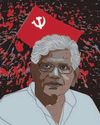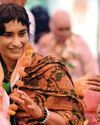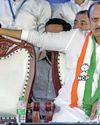Qatar pays the price for charting an alternative course in the Middle East

In December 2015, a hunting party from Qatar arrived at a hunting zone in Iraq’s Muthanna province, 370km southeast of Baghdad. The Iraqi government had assured them that the game reserve was safe. The 26-member group included members from the ruling family. They were, however, kidnapped by Kata’eb Hezbollah, a Shia militant group backed by Iran. Last April, Qatar made a deal with Iran and several militant groups for their release. It apparently involved a huge payout to Iran and the militants, and population swaps involving four villages in Syria. Though Qatar denied that any ransom was paid, its ambassador to Iraq and an emissary of the emir flew to Baghdad on April 15, with 23 sacks full of currencies, worth half a billion dollars. Six days later, the hostages were set free. The payout to Iran angered Saudi Arabia to no end.
About a month later, on May 24, two days after Donald Trump’s visit to Saudi Arabia, official Qatari websites carried reports criticising the US president, praising Iran, reaffirming Qatar’s friendly ties with Israel and warning about recalling its ambassadors from Saudi Arabia, the UAE and Egypt. Qatar denied the reports and said the websites were hacked. Saudi Arabia and the UAE, however, repeated the reports and blocked Qatari media, effectively blacking out the official denial.
On June 5, Saudi Arabia, the UAE, Bahrain and Egypt announced the decision to cut off all diplomatic ties with Qatar, suspend all land, sea and air transport, eject Qataris from their countries and recall their citizens from Qatar. They disallowed Qatari planes to fly over their territories and banned Qatari vessels from their ports. The next day they were joined by the Maldives and the factional governments in Yemen and Libya. The Saudi-led group accused Qatar of backing radical islamist groups like the Muslim Brotherhood.
Denne historien er fra June 18, 2017-utgaven av THE WEEK.
Start din 7-dagers gratis prøveperiode på Magzter GOLD for å få tilgang til tusenvis av utvalgte premiumhistorier og 9000+ magasiner og aviser.
Allerede abonnent ? Logg på
Denne historien er fra June 18, 2017-utgaven av THE WEEK.
Start din 7-dagers gratis prøveperiode på Magzter GOLD for å få tilgang til tusenvis av utvalgte premiumhistorier og 9000+ magasiner og aviser.
Allerede abonnent? Logg på

A golden girl
One of India's most formidable beauties passed away earlier this month. The odd thing is she would absolutely hate this obituary; she hated being written about and avoided publicity for all of her nine decades. Indira Aswani was 93 when she died. But anyone who encountered her, even briefly, was in such awe of her grace and poise, and one could not but remember her forever.

The interest in wine is growing delightfully in India
The renowned British wine writer and television presenter Jancis Robinson, 74, recently came to Delhi and Mumbai to reacquaint herself with India's wine industry. This was the Robinson's fourth visit to India; the last one was seven years ago. On this trip, Robinson and her husband, restaurateur Nicholas Lander, were hosted by the Taj Hotels and Sonal Holland, India's only Master of Wine.

United in the states
Indian-Americans coming together under the Democratic umbrella could get Harris over the line in key battlegrounds

COVER DRIVE
Usage-driven motor insurance policies offer several benefits

GDP as the only measure of progress is illogical
Dasho Karma Ura, one of the world's leading happiness experts, has guided Bhutan's unique gross national happiness (GNH) project. He uses empirical data to show that money cannot buy happiness in all circumstances, rather it is family and health that have the strongest positive effect on happiness. Excerpts from an interview:

India is not a controlling big brother
Prime Minister Tshering Tobgay considers India a benevolent elder sibling as the \"big brotherly attitude\" is happily missing from bilateral ties. He thinks the relationship shared by the two countries has become a model of friendship not just for the region, but for the entire world. \"India's attitude is definitely not of a big brother who is controlling and does not allow the little brother to blossom and grow,\" says Tobgay in an exclusive interview with THE WEEK.

Comrade with no foes
Lal Salaam, Comrade Yechury-you were quite a guy!

Pinning down saffron
In her first political bout, Vinesh Phogat rides on the anti-BJP sentiment across Haryana

MAKE IN MANIPUR
Home-made rockets and weapons from across the border are escalating the conflict

SAHEB LOSES STEAM
Coalition dynamics and poor electoral prospects continue to diminish Ajit Pawar's political stock